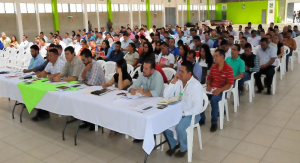Prior to CoST: Public infrastructure in context
 Historically, Guatemala has suffered from a lack of accountability within the infrastructure sector which has resulted in significant time and cost overruns. Despite concerted efforts to develop a more transparent approach to infrastructure governance, Guatemala still faces challenges within this field.
Historically, Guatemala has suffered from a lack of accountability within the infrastructure sector which has resulted in significant time and cost overruns. Despite concerted efforts to develop a more transparent approach to infrastructure governance, Guatemala still faces challenges within this field.
In the area of investment, for instance, hurdles remain. Guatemala lacks a competitive space for private companies to operate in and is largely reliant on foreign investment in order to fund public works. The high levels of debt amongst public bodies means public infrastructure projects are often underfunded, with negative repercussions on quality.
CoST Guatemala: How it all began
Guatemala became the first Latin American country to join CoST during its pilot stage in December 2010. Since then it has operated with the support of government, the private sector, academia and civil society. It also works closely with international agencies such as the UK Department for International Development, the World Bank, USAID, Open Contracting Partnership (OCP) and Hivos.
Prior to joining CoST, a baseline study was carried out in Guatemala which analysed the degree of transparency within public infrastructure. While procuring entities in Guatemala are legally required to disclose 87% of project information, of the 16 projects assessed in the study the disclosure rate stood at just 34%. With this as a starting point, CoST Guatemala began collaborating with procuring entities to promote the disclosure and analysis of infrastructure data in line with the CoST Infrastructure Data Standard (CoST IDS).
The four features of CoST
The CoST approach is focussed on four core features: disclosure, assurance, multi-stakeholder working and social accountability. These features provide a global standard for CoST implementation in enhancing infrastructure transparency and accountability.
Disclosure in Guatemala
The disclosure process ensures that information about the purpose, scope, costs and execution of infrastructure projects is open and accessible to the public, and that it is disclosed in a timely manner.
As the findings of the baseline study indicate, disclosure compliance has been historically low in Guatemala. However, since CoST Guatemala began its work there has been an increase in disclosure rates in line with the CoST IDS from 34% to 58%. The CoST IDS requires 40 data points be disclosed throughout the project cycle and presented in a format that is accessible and understandable for all. In Guatemala, the CoST IDS has been adapted to the country context and 31 data points have been adopted after a legal mandate for disclosure was ratified in 2017. The increase in disclosure we have seen in Guatemala will no doubt have been buoyed by this.
Changing attitudes towards disclosure at an institutional level has not been without its challenges, but over time there has been acceptance of CoST’s objectives within procuring entities and disclosure practices have progressed accordingly.
Training
Training makes up a core part of CoST Guatemala’s stakeholder engagement. In 2017 CoST Guatemala signed an agreement with the National Association of Municipalities to provide ongoing training to authorities, officials and technicians from more than 250 municipalities in the country, and 1200 government officials were trained that year. To date, officials from 237 municipalities have been trained. CoST Guatemala has also published a disclosure manual for the operators of Guatemala’s online data disclosure platform, Guatecompras, in order to facilitate and guide the publication of information on the portal.
In addition, CoST Guatemala has developed training sessions for local government on compliance with the CoST IDS as part of an inter-institutional cooperation project with the Municipal Urban Government and USAID.
Online portals
State Contracting and Procurement Information System (Guatecompras)
Entities and projects evaluated by CoST Guatemala
Legal mandate on disclosure
In 2017 the Guatemalan Congress of the Republic, the country’s unicameral legislature, ratified Decree no. 50-2016 which mandates the disclosure of 31 of the 40 CoST IDS data points through Guatecompras, the national e-procurement portal. This applies to all projects across all procuring entities, and this legislation was achieved as a direct result of multi-sectoral cooperation and the work of CoST Guatemala.
Guatecompras now holds information on over 13,000 projects in line with the CoST IDS, disclosed by over 300 procuring entities. CoST Guatemala is currently in talks with members of the Ministry of Finance to assess the next steps to incorporating all 40 data points of the CoST IDS into Guatecompras.
Assurance in Guatemala
We promote accountability through the CoST assurance process – an independent review of the disclosed data by assurance teams based within CoST national programmes. The teams identify key issues of concern in relation to the items listed in the CoST IDS and put technical jargon into plain language. This allows social accountability stakeholders to easily understand the issues and hold decision-makers to account.
To date CoST Guatemala has delivered eight assurance reports, which have reviewed a total of 122 public infrastructure projects. As mentioned above, disclosure levels have increased over time from 34% to 58% in line with the 31 CoST IDS data points enshrined in Guatemalan law. However, the seventh assurance report, released in 2018, shows that challenges remain in the public infrastructure sector. The report highlights that disclosure in the post-contract stage remains low at just 38%, although at pre-contract stage disclosure stands at an impressive 72%.
The assurance team has also made a number of recommendations to improve the governance of infrastructure projects in Guatemala, including modifications to the Guatecompras website.
Multi-stakeholder working in Guatemala
CoST brings together stakeholder groups with different perspectives and backgrounds from across government, private sector and civil society. Through each national programme’s Multi-Stakeholder Group (MSG), these entities can guide the delivery of CoST and pursue infrastructure transparency and accountability within a neutral forum.
CoST Guatemala’s MSG is made up of the following entities:
Public sector
The Ministry of Public Finance; the Ministry of Communications, Infrastructure and Housing; the National Association of Municipalities of the Republic of Guatemala; the Comptroller General of Accounts; the Secretariat of Planning and Programming of the Presidency
Private sector
Guatemalan Chamber of Construction; the Chamber of Industry of Guatemala
Civil society
Citizen and Guatemalan Action
International organisations
The World Bank; the Inter-American Development Bank.
Social accountability in Guatemala
CoST works with social accountability stakeholders such as the media and civil society to promote the findings from its assurance process so that they can then put key issues into the public domain. In this way, civil society, the media and citizens can all be aware of issues and hold decision-makers to account.
CoST Guatemala’s varied public engagement programme includes capacity building workshops for procuring entities, publicising reports through radio and print media, training civil society organisations and holding bilateral meetings.
Training
CoST Guatemala’s social audit programme – which trains citizens on the key tenets of infrastructure project monitoring – has gone from strength to strength in recent years. In
2020 over 570 civil society and media officials were trained by the programme, including 180 university students who were introduced to social auditing as part of a USAID urban governance programme.
Throughout 2020, CoST Guatemala also supported the Inter-American Development Bank (IADB) and Government of Spain on a project expanding water supply and sanitation across the department of San Marcos. CoST Guatemala worked to strengthen local oversight of project delivery – and increase accountability – through social audit training, which enables communities to monitor levels of transparency and the quality of projects being delivered locally. As a result, citizens were able to flag instances where critical information relating to budgets and feasibility studies was missing. They also monitored delivery of environmental impact assessments, an important tool in a country highly susceptible to the impacts of climate change and drought.
Collaborative learning
Alongside Hivos, the British Embassy in Guatemala, OCP, Data School and Article 19, CoST Guatemala has convened four working groups to address issues relating to transparency in infrastructure. 75 people from 58 institutions attended these sessions, providing a total of 85 solutions to the 18 issues discussed.
CoST Guatemala intends to promote short, medium and long-term solutions based on the dialogue promoted during these discussions, which will relate to infrastructure governance Guatemala.
CoST Guatemala Assurance Reports
First Assurance Report
Second Assurance Report
Third Assurance Report
Fourth Assurance Report
Fifth Assurance Report
Sixth Assurance Report
Seventh Assurance Report
Eighth Assurance Report
Get in touch
Heizel Padilla
CoST Guatemala Country Manager
hpadilla@costguatemala.org